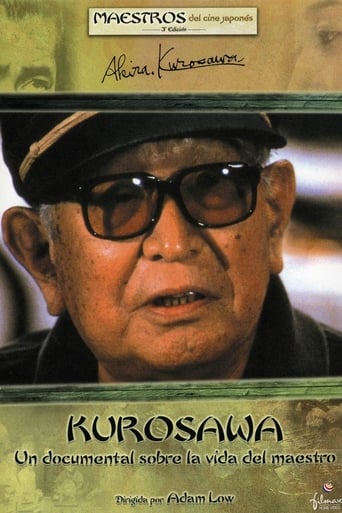

There is a phrase by the experimental filmmaker Nathaniel Dorsky, who says some films are structured like a camera mounted on the head of a dog who goes down an alley, sniffing everything along the way.That's how this movie is. The structure is "Kurosawa started out as a baby, then he became a kid, then a young man, then a movie director, then he started making 'masterpieces', then he grew old, The End." The word 'masterpiece' is used a lot in this film to describe Kurosawa's output, without explaining *what* makes his films so good/great. Just because the off-screen narrator reading a script says that a film is a masterpiece, are we supposed to kiss his rear-end and accept that a certain movie is one of the great works of art of the 20th century? And one more point. The voice of Paul Scofield is used as the voice of Kurosawa, when excerpts from the director's memoirs are being read off screen. He brings pear-shaped Shakespearean tones to the text...but why him?? If you were making a documentary about Billie Holiday, would you use Dame Judi Densch as her voice????
... View MoreThis is a documentary I've seen a few times, as it is fairly well produced and edited together covering the broad scope of the career (and some parts of the life) of filmmaker Akira Kurosawa. The opening images seem pretty neat, with the Tokyo huge-screen in the city plays the infamous arrow climax from Throne of Blood. But it's mostly just an all-too-short pastiche of interviews and some narration that wavers from being informative or kind of unnecessary, depending on whether it's reading from quotes (this is the part that is the latter). It's probably worth noting that the DVD might hold more interest for those who saw the documentary and felt cheated; there's a trove of interview clips that probably out-time the actually running length of the documentary here. Some of the interviews do come into some good use, like from Kurosawa's own family and from those who are still around to kick some small anecdotes or notes of praise. Even Clint Eastood and James Coburn give their dues for some of the pivotal inspirations for their own careers. It's a fitting TV documentary that puts the important bits from Kurosawa's autobiography up-front (i.e. the earthquake in the 20s, the suicide attempt, pretty much all the major works noted to greater or lesser degrees depending on their notoriety). That it isn't the ultimate testament to the director is a letdown, as the more informative, enlightening looks at his work and life can be seen in Stuart Galbraith and Donald Richies books.
... View MoreI would love to see a real filmmaker (Wim Wenders? Scorsese?) tackle Kurosawa - this documentary has it's moments but its' omissions are a little shocking. The earliest bits - detailing Kurosawa's youth and family were most appealing (in spite of the re-enactments); about 1/3 of the way in this documentary really loses steam, offering few insights into Kurosawa's work - with some shocking omissions: STRAY DOG, THE IDIOT, BAD SLEEP WELL, LOWER DEPTHS, HIDDEN FORTRESS and HIGH & LOW aren't touched upon, and are all essential to understanding Kurosawa's working methods and worldview. The voice-over text holding this doc together is largely drawn from Kurosawa's own 'Something Like An Autobiography,' which focuses on his early career; apparently the filmmakers felt it adequate to leave off with that, before wrapping things up with a brief look at his 80s comeback. This was very much a miscalculation.I did enjoy the late James Coburn's reflections upon SEVEN SAMURAI - Coburn came off more like a fanboy than a grizzled veteran, and had his detailed and affectionate appreciation rubbed off on the makers of this documentary it might've really been more of a success. Seeing Japanese screen icon Machiko Kyo was a real treat, and Kurosawa colleagues and scholars like Donald Ritchie and the great Kon Ichikawa were welcome presences; I wished they were given more time to offer opinions. Overall this is no waste of time, but if you're already a fan of Kurosawa, you won't get much out of this either.And if you're really interested at getting into the thoughts, processes, themes and philosophies of Kurosawa, check out some of his less well-known films, the ones ignored here. The hits are as great as they are, but the intricacies of films like RED BEARD, LOWER DEPTHS, IKIRU and STRAY DOG are fascinating, complex and present a well-formed creative universe far more vast than anything suggested in this documentary.
... View MoreHow can a biography on Akira Kurosawa, who felt his life was devoted to the films he wrote and directed, and whose themes centered around the behavior and psychology of the characters, be justified when it fails to even mention 15 of his 32 movies, and does little more than allude to a few key periods in his life?Writer/director, Adam Low, rather than offering substantive information on Kurosawa, felt it more important to provide about 30 minutes of facts and 90 minutes of stretched out long meaningless scenes, including several of modern-day Japan, it's technological advances (do we remember what digital tv/dvd corporations were promoted here?), modern day looks at surviving cast and crew, etc. It felt like a lazy, rushed project.I would think that anyone that watches this documentary would want to walk away with some reasonable amount of insight to either his professional or personal life (if not both). It fails badly on both counts- I give this documentary 2/10 (or 1 out of 4 stars).
... View More